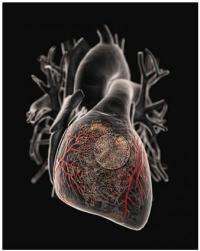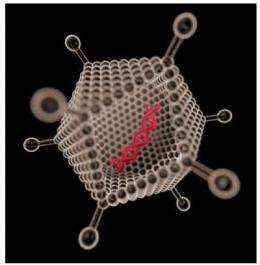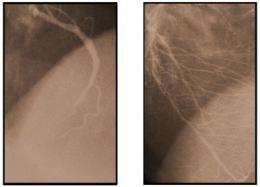Delivery of gene-therapy for heart disease boosted 100-fold; now in 100-patient trial

Cardium Therapeutics today announced a late-breaking poster presentation at the American Society of Gene & Cell Therapy (ASGCT) 15th Annual Meeting being held May 16-19, 2012 at the Pennsylvania Convention Center in Philadelphia, PA.
The new research findings demonstrate that cardiac ischemia plays an important role in adenovector gene transfection (delivery) in mammalian hearts. Based on this understanding, using a standard balloon angioplasty catheter, researchers have developed and tested a new method to induce transient ischemia during a non-surgical interventional cardiac procedure, which when coupled with the infusion of nitroglycerin, boosts the delivery (cell transfection) of an adenovector gene construct into heart cells. The increase in adenovector-based gene transfection with the new technique is over two orders of magnitude (>100 fold).

Cardium's new method of adenovector delivery takes advantage of the findings that transient ischemia appears to alter the permeability barrier of the vascular endothelium and may expose the blood to the coxsackie-adenovirus receptor mediating adenovector uptake by the heart. Balloon angioplasty catheters have been used for many years to dilate blocked coronary arteries, sometimes with use of a stent, and these catheters have also been used safely by cardiologists in patients with coronary artery disease to study the effects of brief ischemia. Cardium's new technique inflates the balloon in non-narrowed areas, and only enough to briefly interrupt flow using inflation pressure that is less than that used for performing angioplasty.
Cardium's recently initiated Russian-based ASPIRE Phase 3 / registration clinical study uses transient ischemia techniques during non-surgical percutaneous catheterization with a standard angioplasty catheter together with the intracoronary infusion of nitroglycerin with the Generx [Ad5FGF-4] product candidate for the treatment of patients with myocardial ischemia and stable angina pectoris. These patients have atherosclerotic coronary artery disease, and the Company's Generx product candidate is intended to stimulate the growth of new or additional collateral blood vessels to bypass blockages.

These studies were conducted at Emory University School of Medicine, led by Jakob Vinten-Johnasen, PhD., and co-sponsored by a Small Business Innovative Research grant from the National Institutes of Health (Cardium Therapeutics) and the Carlyle Fraser Heart Center (Emory). At the conference Gabor M. Rubanyi, MD, PhD, Cardium's Chief Scientific Officer, will present the late-breaking poster entitled "Transient Ischemia is Necessary for Efficient Adenovector Gene Transfer in the Heart", on May 17, 2012 from 3:00 to 5:30 p.m. in Exhibit Hall A. The poster presentation can be viewed here.
In addition, Dr. Rubanyi will also make an oral presentation titled: "New Perspectives for Angiogenic Gene Therapy to Treat Myocardial Ischemia in Patients with Coronary Disease" to attendees at the ASGCT Meeting today, May 16. The presentation will provide a historical overview of the Generx clinical development program and how these new and important preclinical findings have been incorporated into the protocol for the 100-patient Generx ASPIRE Phase 3 registration study which was recently initiated in the Russian Federation for patients with myocardial ischemia and stable angina pectoris. The presentation is available here.
















